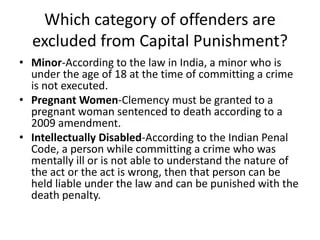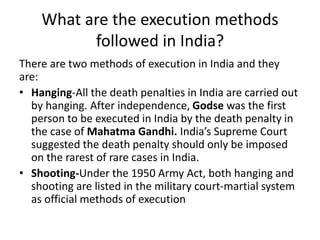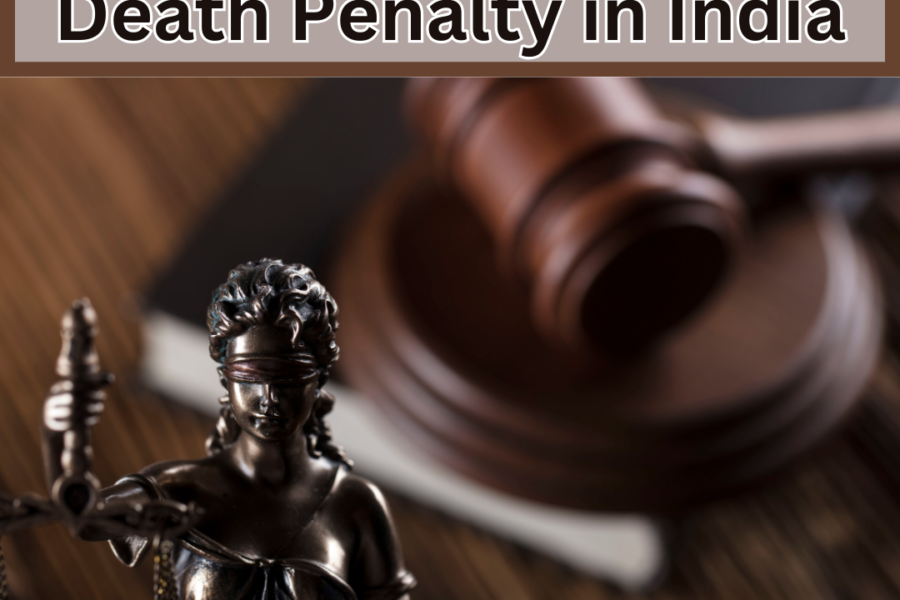The death penalty, or capital punishment, remains one of the most contentious issues in legal systems worldwide, including India. The application of the death penalty involves complex legal procedures, principles, and constitutional considerations. This article aims to provide a thorough descriptive analysis of the legal framework surrounding the death penalty in India, exploring its historical evolution, statutory provisions, judicial interpretations, constitutional safeguards, and contemporary challenges.
Historical Evolution
The history of the death penalty in India dates back to ancient times when various forms of capital punishment were prevalent across different regions and civilizations. During the British colonial era, the death penalty was institutionalized as a means of maintaining colonial control and order. The British legal system introduced formal procedures for capital punishment, which were later inherited by independent India.
Legal Framework:
Statutory Provisions The primary legislation governing the death penalty in India is The Indian Penal Code (IPC) of 1860. The IPC contains provisions prescribing the death penalty as a punishment for certain offences, including murder, acts of terrorism, and treason. For example, Section 302 of the IPC stipulates that murder shall be punished with death or life imprisonment, and Section 121 provides for the death penalty for offences against the state, such as waging war against the government.
Additionally, special laws such as the Prevention of Terrorism Act (POTA), the Armed Forces (Special Powers) Act (AFSPA), and the Narcotic Drugs and Psychotropic Substances Act (NDPS) also contain provisions allowing for the imposition of the death penalty in specific circumstances. These laws confer special powers to law enforcement agencies and armed forces to combat terrorism, insurgency, and drug trafficking, often leading to controversies regarding human rights violations and the arbitrary application of capital punishment.

Judicial Interpretations
The judiciary plays a crucial role in interpreting and applying the legal framework governing the death penalty in India. In the landmark case of Bachan Singh v. State of Punjab (1980), the Supreme Court of India laid down guidelines for the imposition of the death penalty. The Court held that the death penalty should be imposed only in the “rarest of rare” cases where the alternative option of life imprisonment would be unquestionably inadequate. This principle was further elaborated upon in subsequent cases, emphasizing the need for a nuanced and contextual analysis of aggravating and mitigating factors in capital sentencing.
Furthermore, the Supreme Court has established procedural safeguards to ensure fairness and consistency in capital trials. These include the right to legal representation, the presumption of innocence, the prohibition of torture or coercion, and the right to appeal against the death sentence to higher courts. The judiciary has also recognized the importance of mitigating factors such as age, mental health, and socio-economic background in determining the appropriateness of the death penalty.
Constitutional Safeguards
The Constitution of India guarantees fundamental rights, including the right to life and personal liberty, under Article 21. However, Article 21 is subject to reasonable restrictions, including the imposition of the death penalty following due process of law. The judiciary has interpreted Article 21 to impose limitations on the imposition of the death penalty, emphasizing the need for strict adherence to procedural safeguards and principles of natural justice.
Moreover, the Constitution provides for the separation of powers between the judiciary, legislature, and executive, ensuring checks and balances in the exercise of state power. The judiciary acts as a guardian of fundamental rights and has the authority to review legislative and executive actions, including the imposition of the death penalty, to ensure compliance with constitutional principles and international human rights standards.
Contemporary Challenges Despite the legal framework established by the judiciary, the death penalty in India faces numerous challenges and controversies. One of the main concerns is the arbitrary and discriminatory nature of capital sentencing, with marginalized and disadvantaged groups disproportionately represented among death row inmates. Socio-economic disparities, lack of access to legal representation, and systemic biases contribute to the unequal application of the death penalty.
Moreover, there are significant flaws in the administration of justice, including the prevalence of wrongful convictions, coerced confessions, and procedural irregularities. Instances of miscarriages of justice, where individuals are erroneously convicted and sentenced to death, raise serious doubts about the reliability and fairness of capital punishment as a deterrent.

Recent Developments and Debates
In recent years, there have been significant developments and debates surrounding the death penalty in India. The Supreme Court of India has reiterated its stance on limiting the imposition of the death penalty to the “rarest of rare” cases, emphasizing the need for strict adherence to procedural safeguards and principles of natural justice. The judiciary has also recognized the importance of mitigating factors such as age, mental health, and socio-economic background in capital sentencing.
Furthermore, there has been growing public debate and advocacy for the abolition of the death penalty in India. Civil society organizations, human rights activists, and legal experts have called for a moratorium on executions and the eventual abolition of capital punishment, citing its irreversibility, ineffectiveness as a deterrent, and inherent cruelty.
ADV. KHANAK SHARMA


safe and effective drugs are available.
cost cheap lisinopril tablets
An unmatched titan in the world of international pharmacies.
They bridge global healthcare gaps seamlessly.
can i purchase cheap cipro tablets
Cautions.